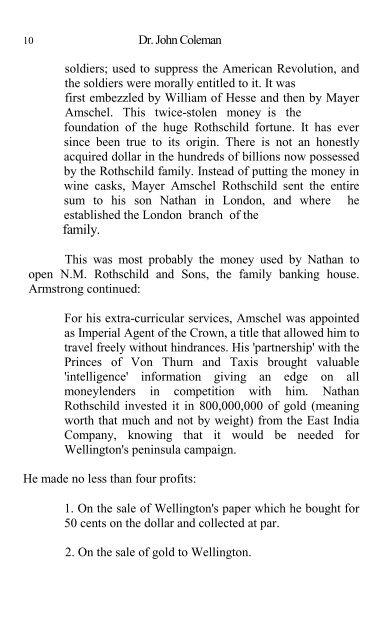coleman-the-rothschild-dynasty
coleman-the-rothschild-dynasty
coleman-the-rothschild-dynasty
You also want an ePaper? Increase the reach of your titles
YUMPU automatically turns print PDFs into web optimized ePapers that Google loves.
10 Dr. John Coleman<br />
soldiers; used to suppress <strong>the</strong> American Revolution, and<br />
<strong>the</strong> soldiers were morally entitled to it. It was<br />
first embezzled by William of Hesse and <strong>the</strong>n by Mayer<br />
Amschel. This twice-stolen money is <strong>the</strong><br />
foundation of <strong>the</strong> huge Rothschild fortune. It has ever<br />
since been true to its origin. There is not an honestly<br />
acquired dollar in <strong>the</strong> hundreds of billions now possessed<br />
by <strong>the</strong> Rothschild family. Instead of putting <strong>the</strong> money in<br />
wine casks, Mayer Amschel Rothschild sent <strong>the</strong> entire<br />
sum to his son Nathan in London, and where he<br />
established <strong>the</strong> London branch of <strong>the</strong><br />
family.<br />
This was most probably <strong>the</strong> money used by Nathan to<br />
open N.M. Rothschild and Sons, <strong>the</strong> family banking house.<br />
Armstrong continued:<br />
For his extra-curricular services, Amschel was appointed<br />
as Imperial Agent of <strong>the</strong> Crown, a title that allowed him to<br />
travel freely without hindrances. His 'partnership' with <strong>the</strong><br />
Princes of Von Thurn and Taxis brought valuable<br />
'intelligence' information giving an edge on all<br />
moneylenders in competition with him. Nathan<br />
Rothschild invested it in 800,000,000 of gold (meaning<br />
worth that much and not by weight) from <strong>the</strong> East India<br />
Company, knowing that it would be needed for<br />
Wellington's peninsula campaign.<br />
He made no less than four profits:<br />
1. On <strong>the</strong> sale of Wellington's paper which he bought for<br />
50 cents on <strong>the</strong> dollar and collected at par.<br />
2. On <strong>the</strong> sale of gold to Wellington.


